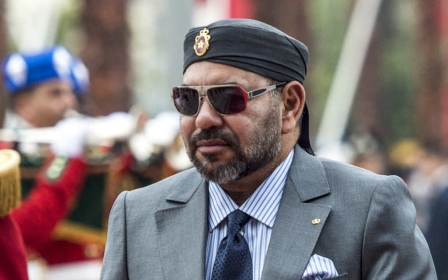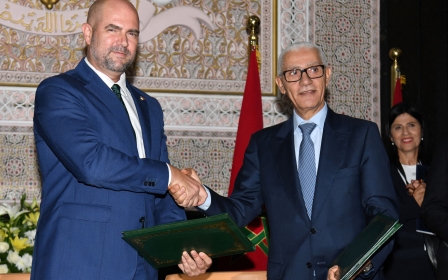Moroccan students make unlikely witnesses to attempted coup in Russia

Two Moroccan students found themselves as unwitting witnesses to one of the biggest stories to come out of Russia in recent years, the short-lived attempted coup against Russian President Vladimir Putin on Saturday.
The moment was caught on camera by the online conflict-reporting channel Noel Reports, at Rostov-on-Don in southern Russia reporting on the Wagner Group's takeover of the city.
Dozens of people can be seen running from loud explosions as the paramilitary forces exchanged fire with the Russian army.
The reporter turns to the bemused students, who are heard saying "we are very scared".
"It's very strange, the first time I see these things," the male student told the reporter. "We don't know what is happening, we are very scared," the young Moroccan woman added.
New MEE newsletter: Jerusalem Dispatch
Sign up to get the latest insights and analysis on Israel-Palestine, alongside Turkey Unpacked and other MEE newsletters
It is unlikely that either student would have imagined that when they chose Rostov-on-Don to study in that they would return to Morocco with more than just a story about a sleepy Russian city.
It's not known how many Moroccan students live in Rostov-on-Don or Russia as a whole.
The city hosts the Rostov State Medical University, the largest training and research centre in the south of Russia.
Every year the Russian state grants 100 scholarships to Moroccan students, but it's widely thought many more students come to the country to study.
On Saturday, Wagner chief Yevgeny Prigozhin, leading an apparent mutiny to bring down leaders in Moscow, said his fighters had captured the army HQ in Rostov-on-Don "without firing a single shot" and claimed to have the support of locals.
Wagner fighters had crossed overnight into Russia from occupied territories in Ukraine and seized the army HQ in the southern city, a key operational hub for Moscow as it continues to prosecute its war in Ukraine.
Wagner forces then advanced north and were about four hours from Moscow when the mutiny was called off, with Prigozhin saying he wanted to "avoid bloodshed". He also said he had ordered his troops to leave Rostov.
It was later announced that Prigozhin will be exiled from Russia to Belarus as part of a truce agreed with Putin and mediated by Belarus.
Putin had denounced Wagner's actions as an "armed mutiny" and vowed to punish the mercenary insurrection.
Middle East Eye delivers independent and unrivalled coverage and analysis of the Middle East, North Africa and beyond. To learn more about republishing this content and the associated fees, please fill out this form. More about MEE can be found here.




